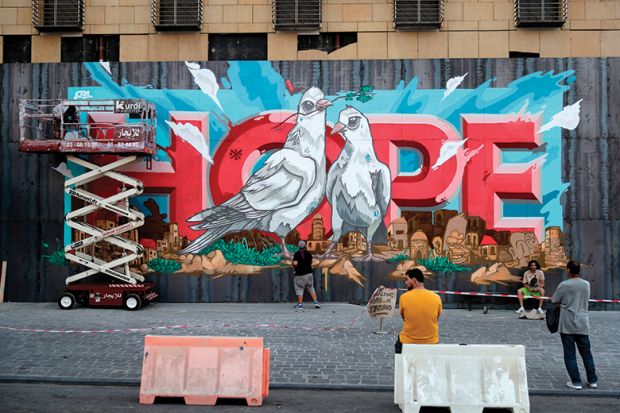While 2020 has been a testing year for higher education institutions across the globe, universities in the Lebanese capital have had to cope with additional catastrophes besides Covid-19.
On 4 August, a large amount of ammonium nitrate stored at the port of Beirut exploded, leading to at least 190 deaths and 6,500 injuries, leaving an estimated 300,000 people homeless, and causing extensive damage to campuses.
Meanwhile, a series of demonstrations have taken place across the country since October 2019, initially triggered by plans for new taxes but quickly escalating into broader protests against the government, the country’s financial crisis, low employment rates and corruption in the public sector. They included student-led marches demanding changes to the funding of higher education, with some students refusing to attend classes.
While former diplomat Mustapha Adib was appointed as the new prime minister of Lebanon on 31 August, the country was without without a government at the time of writing, with Lebanese politicians failing to agree on a new cabinet.
Fadlo Khuri, president of the American University of Beirut (AUB), said the city’s university sector had suffered $150-200 million (£115-154 million) worth of physical damage from the blast, with repairs to his institution alone totalling $7.5 million. Just six of its 40-plus buildings did not sustain damage.
He added that his institution laid off 650 staff three weeks before the explosion hit, as a result of the country’s ongoing economic crisis, and the blast had now “accelerated the emigration of students and faculty and staff”.
“By December I anticipate that 10 to 12 per cent of our faculty will have either taken leave or have left,” he said, predicting that a significant share of these will be academics in the sought-after fields of medicine and business.
Last year, about 25 per cent of AUB’s students were from overseas, but Professor Khuri said he “expects that number will come down”.
“Our goal has to be to hang on to our best faculty and staff and, frankly, to be smaller,” he said, adding that undergraduate numbers will reduce from 7,200 to 5,000 or 6,000, some academic departments will be cut, and the university will need to increase the amount of revenue it receives from overseas governments and foundations.
However, he said that the future of the city’s higher education sector will depend on how the city itself rebuilds from the blast and whether “honest and capable” people form the new government and develop a new economy.
“Will the rest of the world keep watching and allowing a ridiculously corrupt political class to continue to take advantage of Lebanon, or will there be some scrutiny to invest? I would imagine the latter,” he said.
Salim Daccache, rector of Université Saint-Joseph de Beyrouth, which has five campuses located less than one kilometre from the centre of the explosion, said reconstruction and rehabilitation work on the sites will cost more than $2.2 million.
“The economic, political and health crises were already adversely impacting our university budget. If tuition fees remain unchanged, we expect a deficit of about $30 million in the coming year,” he said, adding that 4,500 students needed $9 million worth of financial aid. The university has launched an international campaign to raise funds to rebuild the institution and provide student scholarships.
Joseph Jabbra, president of the Lebanese American University (LAU), which has a campus in Beirut, said that the university already faced an “immense” challenge in ensuring its students could progress academically even before the pandemic and blast as a result of the October Revolution.
While LAU was less affected by the explosion than other universities, its hospital suffered about $1 million worth of damage.
Dr Jabbra said he was “focusing on making sure that the impact of these three major events does not affect negatively our students and their academic programmes” and that he had established a “special fund” to provide financial aid and scholarships to students.
“We don’t want to lose a generation in Lebanon. We are going to do everything we can in order to provide them with the opportunity to continue their studies and go on to build a better Lebanon – a Lebanon that is characterised by democratic practices, that is free of corruption, where there is peace,” he said. “Education is the only answer to the ills that afflict this entire region.”
后记
Print headline: Beirut campuses look beyond blast




